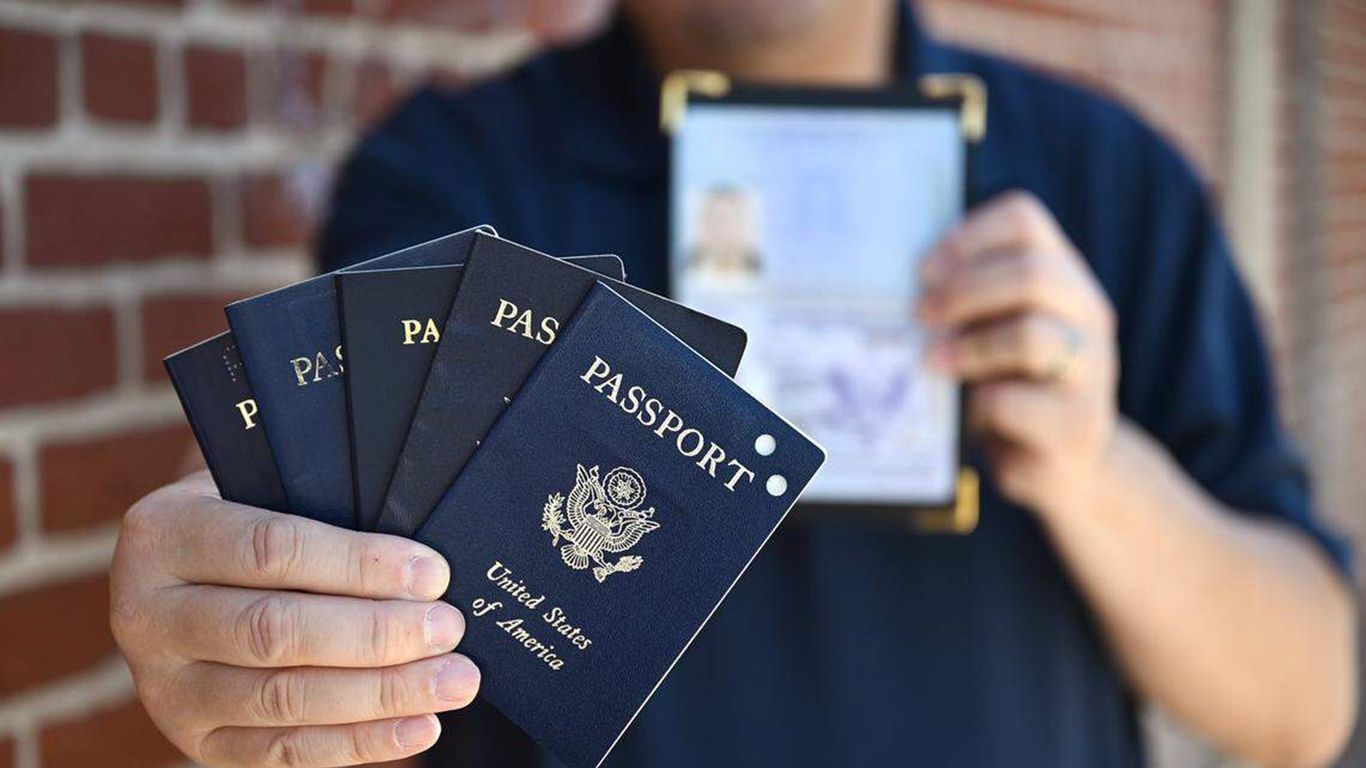
The U.S. passport dropped from the world’s top 10 most powerful list for the first time in the 20-year history of a key rankings index.
Why it matters: The declining strength of the U.S. passport since its No. 1 spot in 2014 “signals a fundamental shift in global mobility and soft power dynamics,” per a statement from Christian Kaelin, chairman of Henley & Partners and creator of the Henley Passport Index that was released this week.
- “Nations that embrace openness and cooperation are surging ahead, while those resting on past privilege are being left behind.”
- The slide comes amid an immigration crackdown by President Trump’s administration that saw the State Department announce that it’s reviewing the records of more than 55 million U.S. visa holders for potential violations. And Henley’s report cites Trump administration policy as one of the contributing factors.
The latest: A State Department spokesperson said U.S. officials remained confident of the strength and global reach of the nation’s passport and that Americans enjoy visa-free or visa-on-arrival access to hundreds of destinations worldwide due to close partnerships the government maintained with countries around the world.
- The spokesperson noted that while international passport rankings may vary based on methodology, the State Department’s focus was on facilitating secure, efficient, and reciprocal travel for U.S. citizens and foreign nationals alike.
State of play: Singapore tops the Henley ranking list, which uses data from the International Air Transport Association to examine passports’ visa-free travel. Singaporeans don’t need a visa for 193 of the 227 destinations worldwide.
- South Korea is second, with visa-free travel in 190 destinations, and Japan is third (189 visa-free destinations).
- The U.S., which dropped to 10th in July after sinking to seventh last year, tied with Malaysia at No. 12, with visa-free access to 180 destinations.
Zoom in: The report cites Trump’s suspension of visa issuance to travelers from 12 nations in Africa, the Middle East and Southeast Asia, his imposing “heavy restrictions on an additional seven” and threats to ban up to 36 more, among other factors.
- Representatives for the White House adid not immediately respond to Axios’ Wednesday night request for comment.
- The loss of visa-free access to Brazil in April due to a lack of reciprocity, the U.S. being left out of China’s expanding visa-free list and Vietnam’s decision to exclude the United States from its latest visa-free additions were among other reasons for the slide, according to the report.
Of note: “Even before a second Trump presidency, U.S. policy had turned inward,” said Annie Pforzheimer, senior associate at the Center for Strategic and International Studies in Washington, D.C., who’s cited in the report.
- “That isolationist mindset is now being reflected in America’s loss of passport power.”
2025 global passport index ranking
1. Singapore — 193 visa-free destinations.
2. South Korea — 190 visa-free destinations.
3. Japan — 189 visa-free destinations.
4. Germany, Italy, Luxembourg, Spain, Switzerland — 188 visa-free destinations.
5. Austria, Belgium, Denmark, Finland, France, Ireland, Netherlands — 187 visa-free destinations.
6. Greece, Hungry, New Zealand, Norway, Portugal, Sweden — 186 visa-free destinations.
7. Australia, Czechia, Malta, Poland — 185 visa-free destinations.
8. Estonia, Slavakia, Slovenia, UAE, U.K. — 184 visa-free destinations.
9. Canada — 183 visa-free destinations.
10. Latvia, Liechtenstein — 182 visa-free destinations.
Go deeper: Trump administration revokes 6 visas over comments about Charlie Kirk
Editor’s note: This article has been updated with comment from a State Department spokesperson.
Disclaimer: This news has been automatically collected from the source link above. Our website does not create, edit, or publish the content. All information, statements, and opinions expressed belong solely to the original publisher. We are not responsible or liable for the accuracy, reliability, or completeness of any news, nor for any statements, views, or claims made in the content. All rights remain with the respective source.
